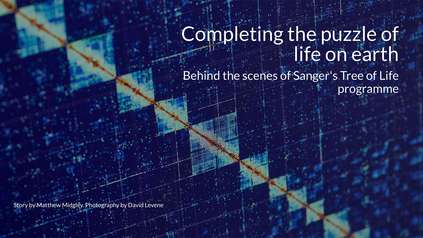Richard Durbin recognised for his contribution to the biology of genomes
The Wellcome Sanger Institute is delighted that Professor Richard Durbin has been honoured by the Japan Society for the Promotion of Science for his outstanding contributions to the field of bioinformatics and genomics. The research field for this year’s International Prize for Biology is the Biology of Genomes and Professor Durbin was selected from 47 leading researchers proposed by universities and institutes around the world.
Richard is currently Al Kindi Professor at the Department of Genetics, University of Cambridge and Associate Faculty at the Wellcome Sanger Institute. Before this, he played a pivotal role in establishing and supporting the Wellcome Sanger Institute as it delivered more than one-third of the first human reference genome. Then, as a senior Faculty leader at the Insitute, he co-led a number of national and international research collaborations that laid the foundations for today’s genomic research endeavours.
Profesor Durbin has, and continues to, play a pivotal role in genomic and bioinformatic research and is a passionate advocate of open-access data to drive global research. From helping to deliver the freely-available human reference genome to co-leading the 1000 Genomes and UK10K research projects, his work has provided vital, large-scale data resources for the global research community to explore human health, disease and diversity. As a testament to transformative effect of his work, Professor Durbin has authored over 400 academic papers that have been cited more than 280,000 times by scientists worldwide.
In parallel with leading international collaborations, Professor Durbin has helped to establish standardised data formats and access protocols to enable global data sharing for ever more fine-grained insights into the genomics of life. These include the development and global adoption of SAM1/BAM2 and VCF3 formats and the BWA4 genome sequence alignment tool. He has also played a significant role in developing a series of technologies related to the Hidden Markov model data analysis method that underpins much of genomic analysis today.
More recently Professor Durbin has contributed to developing theories and methods to explore population genetics. By developing PSMC5 and MSMC6, he created a powerful data analysis method that makes it possible to infer an organism’s population size base on limited genome data. He is a key contributor to the Darwin Tree of Life project that aims to generate reference genomes for all 70,000 eukaryotic species across the UK and, as part of the Earth BioGenome Project, efforts to sequence all life on earth.
“It’s an honour to be given this award and I am very pleased that the fundamental importance of computational methods and analysis to genome biology is being recognised. I am truly grateful to the Sanger Institute and all my colleagues there for creating such an amazing environment that supported me for so long and led me to being honoured in this way. I would like to thank the University of Cambridge for the wonderful opportunities it provides for my research and that of so many others, and to Wellcome for funding my research. Genomic research is a truly collaborative endeavour and this award honours the dedication and imagination of my research team and all the scientists I have had the privilege of working with over the past 30 years.”
Richard Durbin, Al Kindi Professor at the Department of Genetics, University of Cambridge and Associate Faculty at the Wellcome Sanger Institute
The Award ceremony will take place in December at Meiji Kinenkan, Japan. To celebrate the award, a commemorative symposium will be held on 16-17 December in Yokohama, co-organised by SOKENDAI, the Graduate University for Advanced Studies, and the Japan Society for the Promotion of Science.
More information
Notes
1. SAM – Sequence Alignment Map. It is a text-based format for storing DNA sequences against reference genomes. It contains information about the DNA sequence, its aligned position in the genome and its quality.
2. BAM – Binary Alignment Map. It is a binary format for storing the comprehensive raw data of genome sequencing in a lossless, compressed form and is the binary representation of SAM files.
3. VCF – Variant Call Format. It is a text file format used to store variations of DNA sequence found a gene found within different genomes.
4. BWA – Burrows-Wheeler Aligner software. This is a genome sequence alignment tool used to map sequences that have low levels of divergence against a large reference genome, such as the human genome.
5. PSMC – Pairwise Sequentially Markovian Coalescent method. The software developed from this method allows researchers to estimate the demographic history of a species over a time span of thousands of generations from a single individual’s genome sequence.
6. MSMC – Multiple Sequentially Markovian Coalescent method. This software developed from this method enables scientists to infer population size and gene flow from multiple genome sequences from a species.
About the International Prize for Biology
The International Prize for Biology was instituted in April of 1985 by the Committee on the International Prize for Biology. From its establishment, the Prize has commemorated the 60-year reign of Emperor Showa and his longtime devotion to biological research. Now it also pays tribute to the His Majesty the Emperor Emeritus Akihito, who has contributed for many years to advance our understanding of the systematics of gobioid fish, and who has enhanced the reputation and recognition of the biological sciences by developing this Prize.
The Prize, consisting of a certificate, a medal and an award of 10-million yen, is given to the recipient together with an Imperial Gift.





